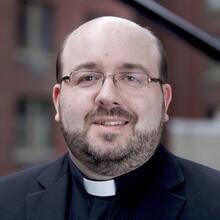A Reflection for the Solemnity of the Annunciation (Friday of the Third Week of Lent)
“A body you prepared for me” (Heb 10:5).
I discovered when I sat down to write this reflection that, either providentially or absurdly, I had been assigned the identical first reading and Gospel when I wrote my Advent reflection, where I said it’s O.K. to ask God for a sign. So I won’t say that again, but if that’s what you need to hear today, click back over to Advent for it.
The second reading for the Annunciation, from Hebrews, wasn’t in the readings back in December, and it’s what caught my attention today.
The Annunciation almost always occurs during Lent, except for those rare times when Easter falls in late March since even the Annunciation does not override the Triduum. When that happens, we transfer the Annunciation forward into the Easter Season.
But this means that most years, our Lenten focus on repentance, conversion and renewal gets interrupted—or maybe “inflected” is a better word—with the reminder that Christmas is nine months away and that God is already in our midst, in Mary’s womb, with her “yes,” in the process of being born into the world and into our flesh.
The writer of the letter to the Hebrews emphasizes the connection between Jesus’ humanity, his being in our flesh and sharing our nature, and the offering of one perfect sacrifice to wash away sins. Jesus, united with the Father in divinity and also united with us in our humanity, offers himself and so consecrates us to God. The letter to the Hebrews quotes—or rather slightly misquotes—Psalm 40’s “sacrifice and offering you did not desire.” The psalmist continues that phrase by saying to God that instead of desiring sacrifice, “you opened my ears” (or, in the much more concrete poetry of the original Hebrew, “ears you dug for me”). But that has become, in the Greek of the letter to the Hebrews, “a body you prepared for me.”
Because there is no incarnation without bodiliness, without flesh. There is no union between human and divine without Jesus’ body, the body prepared for him. But there is also no incarnation without Mary’s body, without her nurturing Jesus through nine months and then raising him through infancy and childhood when he was entirely dependent on others for his bodily needs, as all of us are at our beginning and will be at our end.
And there is no incarnation without our bodies as well, without us as the mystical body of Christ, baptized into his death and resurrection. We find our share in Christ’s incarnation not only in faith felt spiritually but also in the communion we share when we join with each other, bodies jostling next to each other in the pew, as kneelers clank up and down, as we fall into procession together to receive the body of Christ and become what we receive.
Much of the traditional devotion of Lent involves bodiliness as well: fasts and abstinence, giving up simple pleasures such as favorite foods—but also giving to the poor, sustaining the needs of the bodies of others. There is wisdom here that deserves our attention, especially as we celebrate the Annunciation. “A body you prepared for me”: And so may we prepare ourselves, body and soul, to be renewed as the body of Christ this coming Easter.
Get to know Sam Sawyer, senior editor and director of digital strategy
What are you giving up for Lent?
Snacking, and I try to keep a complete fast till dinner on Fridays. I’ve tried a lot of different Lenten practices over the years, but I’ve come back to the ascetism of “giving something up,” and being physically hungry is a better reminder for me of what I’m doing and why than any amount of attention I can muster just by thinking about it.
Do you cheat on Sundays?
Yes. My grandfather, perhaps the most devout and disciplined man I’ve ever met, gave up alcohol for Lent but had wine with dinner on Sundays. I’m not going to be prideful enough to think I know better than him.
Favorite non-meat recipe
Hummus, freshly made and ideally from chickpeas soaked overnight and cooked. Lots of garlic, a fair bit of cumin (fresh toasted and ground is a game-changer), and good olive oil.
Favorite Lenten art
It’s the Annunciation, so I get to share Henry Ossawa Tanner’s gorgeous painting:









